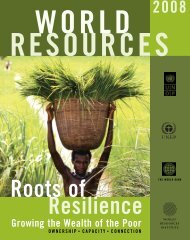jp8589 WRI.qxd - World Resources Institute
jp8589 WRI.qxd - World Resources Institute
jp8589 WRI.qxd - World Resources Institute
Create successful ePaper yourself
Turn your PDF publications into a flip-book with our unique Google optimized e-Paper software.
WORLD RESOURCES 2005<br />
coexist uneasily with landlessness, poverty, and the hovering<br />
specter of hunger in many parts of the developing world.<br />
Additional impetus comes from research showing that<br />
unequal access to land and other productive assets is a defining<br />
feature of persistent poverty (Riddell 2000). Peruvian economist<br />
Hernando de Soto argues that the lack of a well-defined system<br />
for recording, transferring, and enforcing the property rights of<br />
the poor is a major source of continued poverty, since it does not<br />
allow the poor to make use of their assets for collateral and credit,<br />
thus barring them from productive investments (de Soto 2000).<br />
These and other findings have contributed to a growing<br />
consensus that establishing secure property rights and making<br />
rural land markets work for poor farmers and rural producers is<br />
one of the keys to effective poverty reduction. In fact, de Soto<br />
goes so far as to predict that the countries that achieve substantial<br />
economic progress over the next two decades will be those that<br />
have developed strong property rights institutions (Riddell 2000).<br />
Against this backdrop, tenure reform has emerged as an<br />
essential component of a broader sociopolitical transition to<br />
greater democracy and decentralization in developing<br />
countries. Governments are starting to recognize that customary,<br />
community-based tenure systems are legal in their own<br />
right. They are beginning to put these systems on an equal legal<br />
footing with Western, individualized property rights (Alden<br />
Wily et al. 2000). Tenure reform movements are active in all<br />
regions of the developing world, including Sub-Saharan Africa,<br />
Asia, Latin America, and Central and Eastern Europe, with<br />
dozens of countries initiating major tenure-reform efforts in the<br />
past decade. For example, Thailand has recently completed a<br />
major initiative to provide the country’s rural population with<br />
access to modern land registration, deeds, and credit institutions<br />
(Riddell 2000). Mexico has undertaken reforms to strengthen<br />
land and credit markets and improve the access to land among<br />
poorer households (Carter 2003:52).<br />
Whether tenure reforms positively or adversely affect the<br />
poor depends on who designs and ultimately implements them.<br />
The extent to which the interests of the poor are represented and<br />
promoted by national and local institutions—both critical<br />
players in enforcing tenure rights—is key to ensuring that tenure<br />
reforms do in fact assist the poor.<br />
Decentralization: Can It Help the Poor?<br />
Across diverse economic and policy sectors, from health care and<br />
education to parks and wildlife management, decentralization is<br />
one of the most frequently pursued institutional reforms in<br />
developing countries today.<br />
Decentralization is a process by which a central government<br />
transfers some of its powers or functions to a lower level of<br />
government or to a local leader or institution. In the naturalresource<br />
sector, an example of decentralization might be<br />
transferring from central to local government the responsibility<br />
for managing a tract of forest land, including the right to collect<br />
some of the income from sales of timber harvests in that forest.<br />
Or the central government might give a farmers group responsibility<br />
for managing an irrigation system, or grant a village<br />
TABLE 3.1 DECENTRALIZATION: WILL IT HELP THE POOR?<br />
62<br />
Pros<br />
Promotes democracy because it provides better opportunities for local<br />
residents to participate in decision-making.<br />
Increases efficiency in delivery of public services; delegation of<br />
responsibility avoids bottlenecks and bureaucracy.<br />
Provides a chance for poor households to participate in local<br />
institutions and have their concerns recognized.<br />
Leads to higher quality of public services because of local accountability<br />
and sensitivity to local needs.<br />
Enhances social and economic development, which rely on<br />
local knowledge.<br />
Increases transparency, accountability, and the response-capacity of<br />
government institutions.<br />
Allows greater political representation for diverse political, ethnic,<br />
religious, and economic groups in decision-making.<br />
Increases political stability and national unity by allowing citizens to<br />
better control public programs at the local level.<br />
Source: Adapted from ICHRP 2005<br />
Cons<br />
Undermines democracy by empowering local elites, beyond the reach or<br />
concern of central government.<br />
Worsens delivery of service in the absence of effective controls<br />
and oversight.<br />
Local institutions mirror the anti-poor biases present at the state level.<br />
Quality of services deteriorates due to lack of local capacity and<br />
insufficient resources.<br />
Gains arising from participation by local people offset by increased<br />
corruption and inequalities among regions.<br />
Promises too much and overloads capacity of local governments.<br />
Creates new tensions or ignites dormant ethnic and religious rivalries.<br />
Weakens states because it can increase regional inequalities, lead to<br />
separatism, or undermine national financial governance.

















